2022中考英语一轮复习PPT课件 第18课时 Units 9—10,Book 9
文档属性
| 名称 | 2022中考英语一轮复习PPT课件 第18课时 Units 9—10,Book 9 | 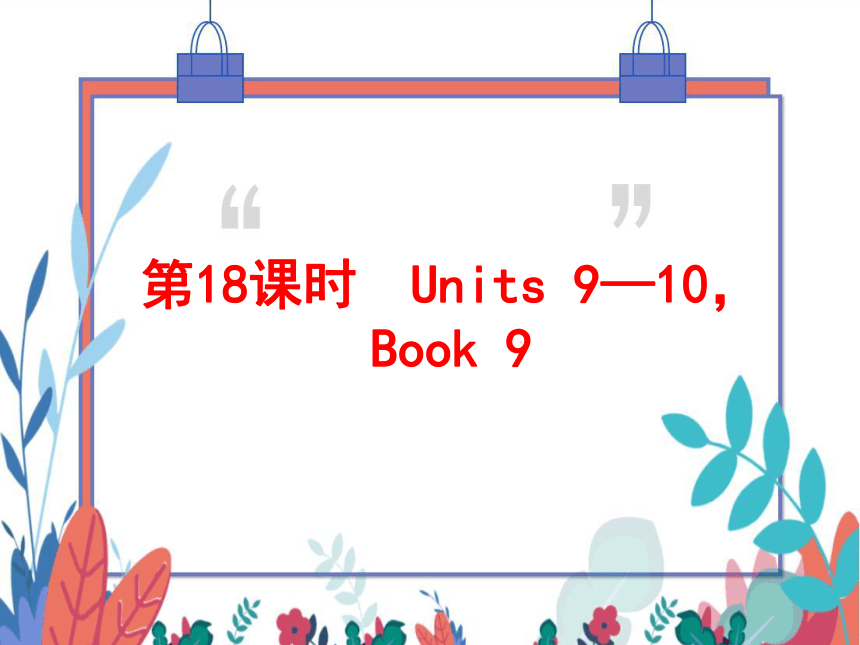 | |
| 格式 | ppt | ||
| 文件大小 | 711.0KB | ||
| 资源类型 | 试卷 | ||
| 版本资源 | 通用版 | ||
| 科目 | 英语 | ||
| 更新时间 | 2022-06-01 15:06:18 | ||
图片预览

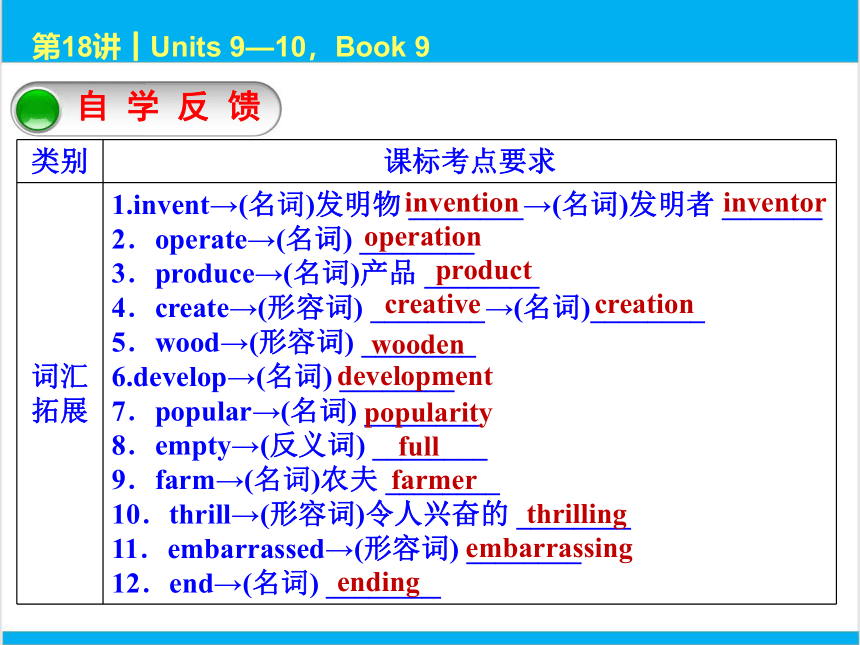
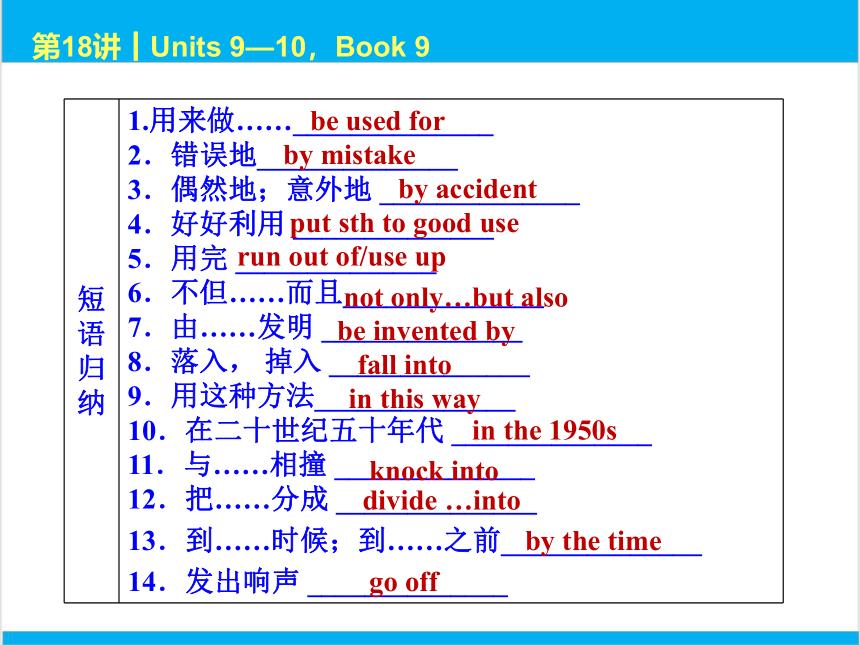
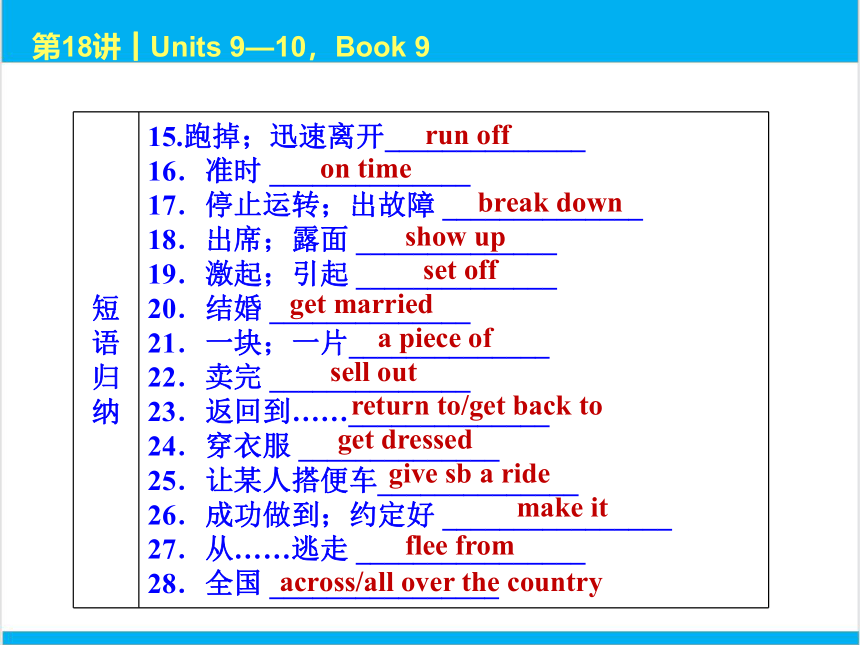
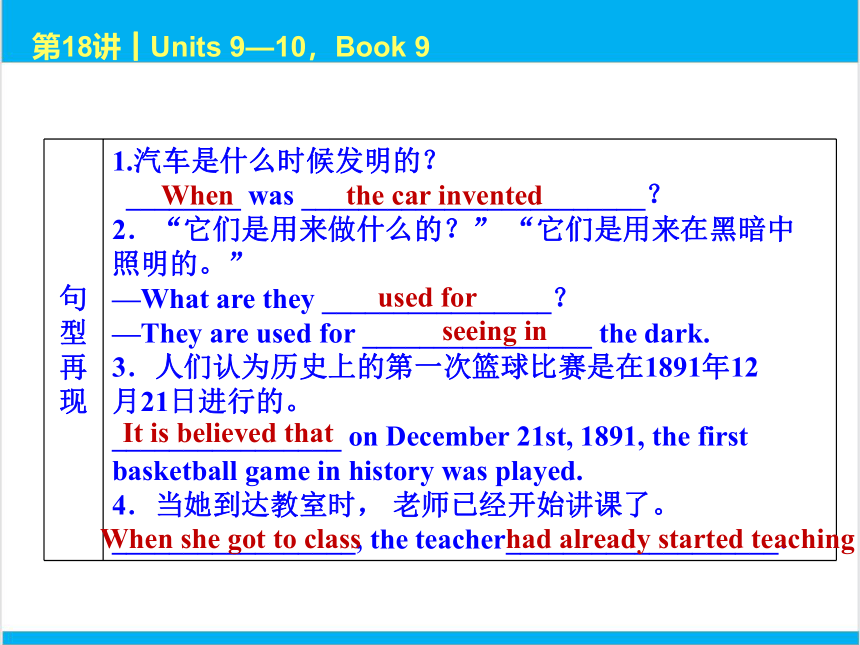
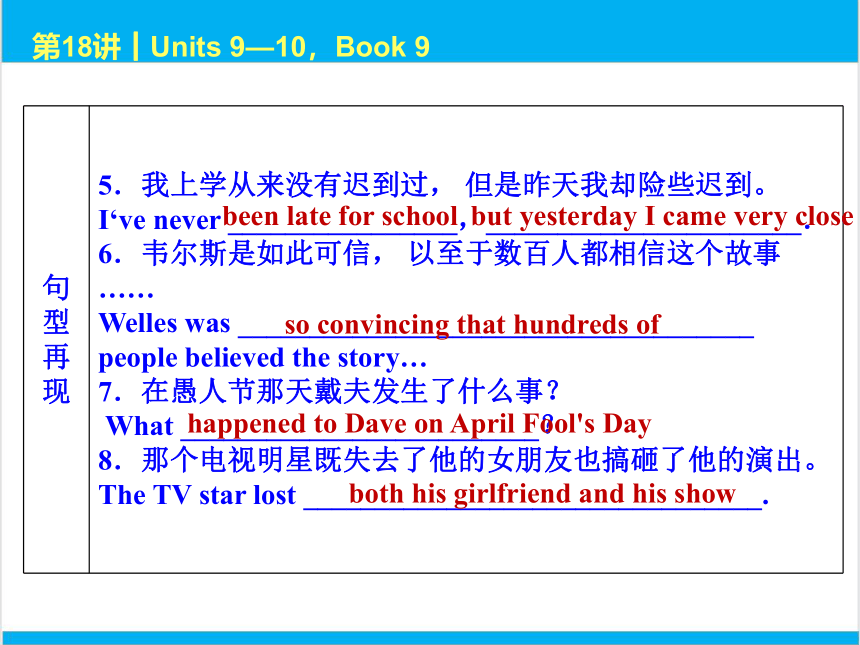
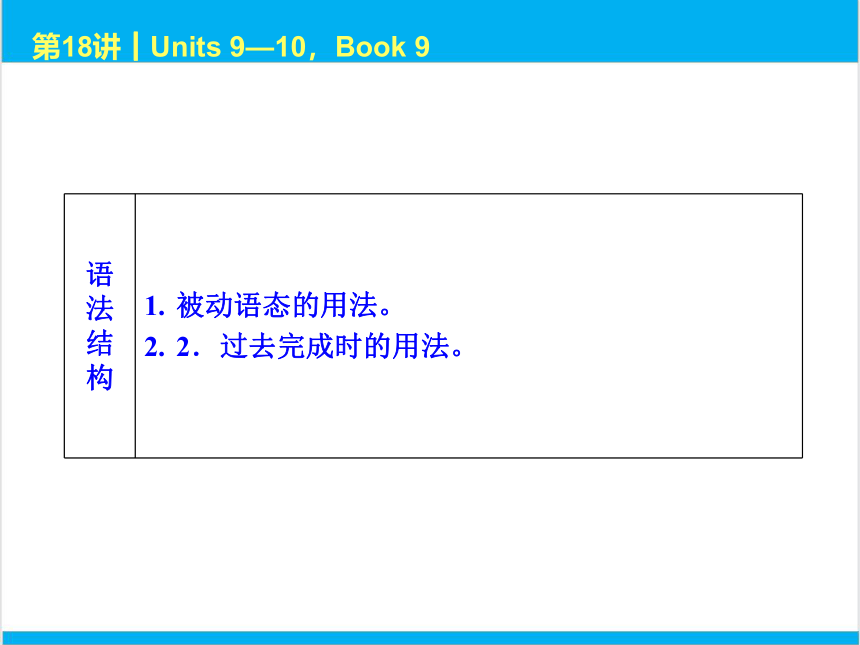
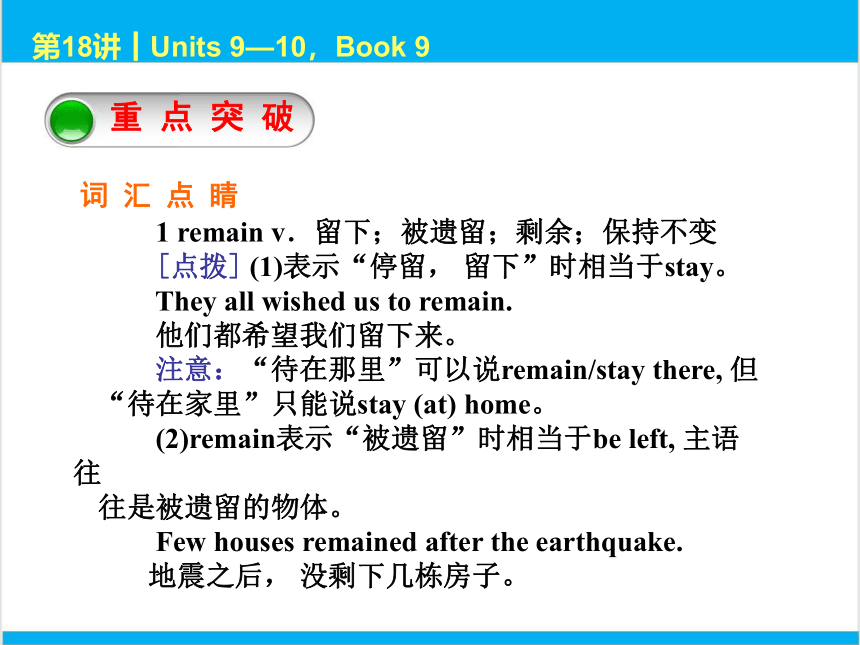
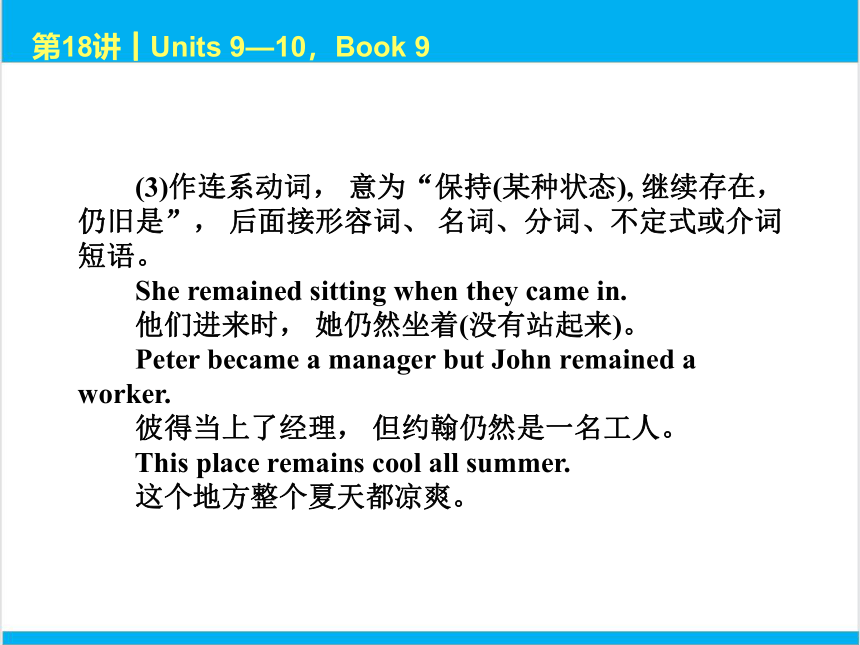
文档简介
(共29张PPT)
第18课时 Units 9—10,Book 9
第18讲┃Units 9—10,Book 9
自 学 反 馈
类别 课标考点要求
词汇
拓展 1.invent→(名词)发明物 ________→(名词)发明者 _______
2.operate→(名词) ________
3.produce→(名词)产品 ________
4.create→(形容词) ________→(名词)________
5.wood→(形容词) ________
6.develop→(名词) ________
7.popular→(名词) ________
8.empty→(反义词) ________
9.farm→(名词)农夫 ________
10.thrill→(形容词)令人兴奋的 ________
11.embarrassed→(形容词) ________
12.end→(名词) ________
invention
inventor
operation
product
creative
creation
wooden
development
popularity
full
farmer
thrilling
embarrassing
ending
短语
归纳 1.用来做……______________
2.错误地______________
3.偶然地;意外地 ______________
4.好好利用 ______________
5.用完 ______________
6.不但……而且______________
7.由……发明 ______________
8.落入, 掉入 ______________
9.用这种方法______________
10.在二十世纪五十年代 ______________
11.与……相撞 ______________
12.把……分成 ______________
13.到……时候;到……之前______________
14.发出响声 ______________
be used for
by mistake
by accident
put sth to good use
run out of/use up
not only…but also
be invented by
fall into
in this way
in the 1950s
knock into
divide …into
by the time
go off
第18讲┃Units 9—10,Book 9
短语
归纳 15.跑掉;迅速离开______________
16.准时 ______________
17.停止运转;出故障 ______________
18.出席;露面 ______________
19.激起;引起 ______________
20.结婚 ______________
21.一块;一片______________
22.卖完 ______________
23.返回到……______________
24.穿衣服 ______________
25.让某人搭便车______________
26.成功做到;约定好 ________________
27.从……逃走 ________________
28.全国 ________________
run off
on time
break down
show up
set off
get married
a piece of
sell out
return to/get back to
get dressed
give sb a ride
make it
flee from
across/all over the country
第18讲┃Units 9—10,Book 9
句型
再现 1.汽车是什么时候发明的?
________ was ________________________?
2.“它们是用来做什么的?” “它们是用来在黑暗中
照明的。”
—What are they ________________?
—They are used for ________________ the dark.
3.人们认为历史上的第一次篮球比赛是在1891年12
月21日进行的。
________________ on December 21st, 1891, the first
basketball game in history was played.
4.当她到达教室时, 老师已经开始讲课了。
_________________, the teacher___________________.
When
the car invented
used for
seeing in
It is believed that
When she got to class
had already started teaching
第18讲┃Units 9—10,Book 9
句型
再现 5.我上学从来没有迟到过, 但是昨天我却险些迟到。
I‘ve never ________________,______________________.
6.韦尔斯是如此可信, 以至于数百人都相信这个故事
……
Welles was ____________________________________
people believed the story…
7.在愚人节那天戴夫发生了什么事?
What _________________________?
8.那个电视明星既失去了他的女朋友也搞砸了他的演出。
The TV star lost ________________________________.
been late for school
but yesterday I came very close
so convincing that hundreds of
happened to Dave on April Fool's Day
both his girlfriend and his show
第18讲┃Units 9—10,Book 9
语法
结构 被动语态的用法。
2.过去完成时的用法。
第18讲┃Units 9—10,Book 9
词 汇 点 睛
1 remain v.留下;被遗留;剩余;保持不变
[点拨] (1)表示“停留, 留下”时相当于stay。
They all wished us to remain.
他们都希望我们留下来。
注意:“待在那里”可以说remain/stay there, 但
“待在家里”只能说stay (at) home。
(2)remain表示“被遗留”时相当于be left, 主语往
往是被遗留的物体。
Few houses remained after the earthquake.
地震之后, 没剩下几栋房子。
重 点 突 破
第18讲┃Units 9—10,Book 9
(3)作连系动词, 意为“保持(某种状态), 继续存在,
仍旧是”, 后面接形容词、 名词、分词、不定式或介词
短语。
She remained sitting when they came in.
他们进来时, 她仍然坐着(没有站起来)。
Peter became a manager but John remained a
worker.
彼得当上了经理, 但约翰仍然是一名工人。
This place remains cool all summer.
这个地方整个夏天都凉爽。
第18讲┃Units 9—10,Book 9
中考典例
The had a wnderful time at the party. They ate and ate until no food remained on the table. [2021·黄冈]
A remained of B was left
C needed D remembered
B
解析
remain 在此相当于be left
第18讲┃Units 9—10,Book 9
2 break down 停止运转;出故障
[点拨] (1)break down相当于不及物动词, 无被动结
构, break的过去式和过去分词分别为broke, broken。
His car broke down on the way home.
他的汽车在回家的路上坏了。
(2)break down还可指“(身体)垮掉”。
His father's health broke down because of hard work.
他父亲的身体因艰苦的劳动而垮掉了。
(3)相关短语:break off中断;突然中止;break
out(战争、灾难等)突然发生;爆发;break into强行闯入。
第18讲┃Units 9—10,Book 9
中考典例
I was late because the bus _____ on my way to school.[2021·遵义]
A broke down
B broke off
C broke up
A
第18讲┃Units 9—10,Book 9
3 set off 激起;引起
[点拨] (1)set off 为动副词组。
Be careful with the fireworks, the slightest spark could
set them off.
要小心烟火, 稍有火星就会引爆它们。
(2)set off还有“出发, 动身”之意, 与set out意思相
同, 作不及物动词。
They are setting off for London.
他们正要动身去伦敦。
第18讲┃Units 9—10,Book 9
4 show up 出席;露面
[点拨] Today we had a parents' meeting, but some
students' parents didn't show up.
今天我们开了家长会, 但有些学生的家长未出席。
[拓展] 相关短语:show off 炫耀,卖弄; show sb
around 带领某人参观……; show sb sth/show sth to sb
把……给某人看。
第18讲┃Units 9—10,Book 9
5 marry v.嫁;娶;与某人结婚
[常考搭配] marry sb 嫁/娶某人;与某人结婚
be/get married to sb 与某人结婚
marry sb to sb 把某人嫁给某人
Will you marry me?你愿意和我结婚吗?
Jim and Jane got married in May.
吉姆和简在5月份结婚了。
[点拨] (1)marry和get married均为非延续性动词
(短语), 句中有延续性时间状语时, 应用be married。
(2)marry是及物动词, “与某人结婚” 直接说marry
sb, 不可以说marry with sb。
[拓展] marriage n.婚姻; married adj.已婚的
第18讲┃Units 9—10,Book 9
6 go off
[点拨] (1)意为“发出响声”。
Listen! The alarm clock is going off. 听!闹铃响了。
(2)意为“(食物等)变坏”。
Meat goes off easily in hot weather.
在热天, 肉很容易变坏。
(3)意为“(电、自来水、煤气等)供源被切断、停止供
应;(电灯等)熄灭”。
Suddenly the lights went off. 灯突然熄灭了。
[常考搭配]go after 追求;追捕
go ahead 走在前面;继续前进
go away 离去 go back 回去
go by 走过;过去 go over 复习;(仔细)检查
第18讲┃Units 9—10,Book 9
巧 辩 异 同
1 invent/discover/find/create
(1)invent指“发明, 创造”一件原先不存在的东西。
Edison invented the light bulb.
爱迪生发明了电灯泡。
(2)discover指“发现”原来就有而一直没被发现的东西(如
发现电、煤、石油等矿藏及新星、星系或科学真理等)。
Columbus discovered America in 1492.
1492年哥伦布发现了美洲。
第18讲┃Units 9—10,Book 9
(3)find意为“找到”, 强调找的结果, 并不指发现。
I've tried to find another copy but can't find one.
我试图再找一本, 但没能找到。
(4)create指有目的地把原材料“制成”新产品, 也指“创
造”出原来不存在的或与众不同的事物。
A novelist creates characters and a plot.
小说家塑造人物并设计一个情节。
第18讲┃Units 9—10,Book 9
2 forget/leave
单词 意义 常见结构
forget 忘,
忘记
forget sb/sth 忘记某人/某事
forget to do sth 忘记做某事(未做)
forget doing sth忘记做过某事(已做)
forget + 宾语从句 忘了……
leave leave sth + 地点状语
把某物忘在了某地
I have forgotten his address and telephone number.
我忘了他的地址和电话号码。
After she had finished reading the magazine, she left it in her office.看完杂志后, 她把它忘在办公室了。
第18讲┃Units 9—10,Book 9
中考典例
—I’m sorry, Mr Li. I _____ my English homework at home.
—Don’t forget _____ it to school tomorrow. [2021·齐齐哈尔]
A left; to bring
B forgot; to take
C lost; to bring
A
解析
“leave sth+地点”意为“把某物忘在某地”;forget to do sth 意为“忘记做某事”
第18讲┃Units 9—10,Book 9
3 be used for/be used as/be used by
(1)be used for 意为“被用来做……”, 介词for 表示用途, 后接名词或动词?ing形式, 同义短语是be used to do sth。
The pencil is used for writing.=The pencil is used to write.
铅笔是用来写字的。
(2)be used as 意为“被用作……”, 介词as表示“作为”, 其后一般接名词。
Coal is used as fuel. 煤被用作燃料。
(3)be used by 意为“被……使用”, 介词by后面接动作的执行者(宾语)。
Piggy banks are used by children to save money in.
小孩子用猪形储钱罐存钱。
第18讲┃Units 9—10,Book 9
中考典例
Bamboo can _____ paper [2021·兰州]
A used to make B be used make
C be used to make D be used to making
C
解析
考查be used to do sth 结构。此句也可写成“Bamboo can be used for making paper.”
第18讲┃Units 9—10,Book 9
1 It is believed that on December 21st, 1891, the first
basketball game in history was played.
人们认为历史上的第一次篮球比赛是在1891年12月
21日进行的。
[句型] It is believed that…意为“人们相信/认
为……”, 相当于“People believe that…”, 其中it为形
式主语, that从句是真正的主语。
[拓展] “It is+过去分词+that 从句”是固定句型,
类似结构还有:It is said that…据说;It's reported
that…据报道;It's known that…众所周知……
It's said that his son will go abroad next month.
=People say that his son will go abroad next month.
据说, 他儿子下个月要出国。
句 型 透 视
第18讲┃Units 9—10,Book 9
2 By the time I got outside, the bus had already left.
当我到外面时, 公共汽车已经开走了。
[点拨] (1)by the time意为“到……时候为止”, 强
调的是从过去某一时间点开始到从句所表示的时间为止
的这段时间, 主句谓语动词的动作发生在从句谓语动词
的动作之前, 主句只能用过去完成时态。
By the time I got home, my mother had cooked
supper. 当我到家时, 妈妈已经做好晚饭了。
第18讲┃Units 9—10,Book 9
(2)过去完成时表示在过去某一动作或时间以前已发
生或完成了的动作, 其发生的时间是“过去的过去”;也
可以表示从过去某一时间持续到过去另一时间的动作或
状态, 其结构为“had+动词的过去分词”。
过去完成时的主要用法有:
①通常由when引导的从句或by引导的短语作时间状语。
②常放在宾语从句中, 即常用在said, told, asked等词后。
中考典例
—Why was he late for school yesterday
—He overlept. By the time he got to the bus stop, the bus ______ already _______ . [2021·襄阳]
A was; leaving B has; left
C would; leave D had; left
D
解析
由“by the time”可知leave这个动作发生在“got to the bus stop”这个动作之前,即过去的过去,所以“离开”这个动作要用过去完成时,故选D。
第18讲┃Units 9—10,Book 9
3 Welles was so convincing that hundreds of
people believed the story…
韦尔斯是如此可信, 以至于数百人都相信这个故
事……
[句型] (1)“so+形容词或副词+that从句”意为
“如此……以至于……”, that 后跟结果状语从句。
(2)so that 可用来引导目的状语从句和结果状语从
句, 结果状语从句中不用情态动词。
He got up so late that he missed the early bus.
他起床太晚了以至于错过了早班车。
He came to London so that he could see his
parents.
为了能见到父母, 他来到了伦敦。
第18讲┃Units 9—10,Book 9
[拓展] such…that与so…that都可引导结果状语
从句, 要特别注意其结构:
(1)so+adj./adv.+that从句
(2)so+adj.+a/an+单数名词+that从句
(3)such+a/an+adj.+单数名词+that从句
(4)such+adj.+复数名词/不可数名词+that从句
The little girl is so lovely that we all like her.
=She is such a lovely girl that we all like her.
这个女孩如此可爱, 以至于我们都喜欢她。
第18讲┃Units 9—10,Book 9
中考典例
He was _____ tried _____ he could not go on walking [2019·遂宁]
A too; to B such; that C so; that
C
解析
“so +形容词或副词+that从句”意为“如此……以至于……”。
第18讲┃Units 9—10,Book 9
第18课时 Units 9—10,Book 9
第18讲┃Units 9—10,Book 9
自 学 反 馈
类别 课标考点要求
词汇
拓展 1.invent→(名词)发明物 ________→(名词)发明者 _______
2.operate→(名词) ________
3.produce→(名词)产品 ________
4.create→(形容词) ________→(名词)________
5.wood→(形容词) ________
6.develop→(名词) ________
7.popular→(名词) ________
8.empty→(反义词) ________
9.farm→(名词)农夫 ________
10.thrill→(形容词)令人兴奋的 ________
11.embarrassed→(形容词) ________
12.end→(名词) ________
invention
inventor
operation
product
creative
creation
wooden
development
popularity
full
farmer
thrilling
embarrassing
ending
短语
归纳 1.用来做……______________
2.错误地______________
3.偶然地;意外地 ______________
4.好好利用 ______________
5.用完 ______________
6.不但……而且______________
7.由……发明 ______________
8.落入, 掉入 ______________
9.用这种方法______________
10.在二十世纪五十年代 ______________
11.与……相撞 ______________
12.把……分成 ______________
13.到……时候;到……之前______________
14.发出响声 ______________
be used for
by mistake
by accident
put sth to good use
run out of/use up
not only…but also
be invented by
fall into
in this way
in the 1950s
knock into
divide …into
by the time
go off
第18讲┃Units 9—10,Book 9
短语
归纳 15.跑掉;迅速离开______________
16.准时 ______________
17.停止运转;出故障 ______________
18.出席;露面 ______________
19.激起;引起 ______________
20.结婚 ______________
21.一块;一片______________
22.卖完 ______________
23.返回到……______________
24.穿衣服 ______________
25.让某人搭便车______________
26.成功做到;约定好 ________________
27.从……逃走 ________________
28.全国 ________________
run off
on time
break down
show up
set off
get married
a piece of
sell out
return to/get back to
get dressed
give sb a ride
make it
flee from
across/all over the country
第18讲┃Units 9—10,Book 9
句型
再现 1.汽车是什么时候发明的?
________ was ________________________?
2.“它们是用来做什么的?” “它们是用来在黑暗中
照明的。”
—What are they ________________?
—They are used for ________________ the dark.
3.人们认为历史上的第一次篮球比赛是在1891年12
月21日进行的。
________________ on December 21st, 1891, the first
basketball game in history was played.
4.当她到达教室时, 老师已经开始讲课了。
_________________, the teacher___________________.
When
the car invented
used for
seeing in
It is believed that
When she got to class
had already started teaching
第18讲┃Units 9—10,Book 9
句型
再现 5.我上学从来没有迟到过, 但是昨天我却险些迟到。
I‘ve never ________________,______________________.
6.韦尔斯是如此可信, 以至于数百人都相信这个故事
……
Welles was ____________________________________
people believed the story…
7.在愚人节那天戴夫发生了什么事?
What _________________________?
8.那个电视明星既失去了他的女朋友也搞砸了他的演出。
The TV star lost ________________________________.
been late for school
but yesterday I came very close
so convincing that hundreds of
happened to Dave on April Fool's Day
both his girlfriend and his show
第18讲┃Units 9—10,Book 9
语法
结构 被动语态的用法。
2.过去完成时的用法。
第18讲┃Units 9—10,Book 9
词 汇 点 睛
1 remain v.留下;被遗留;剩余;保持不变
[点拨] (1)表示“停留, 留下”时相当于stay。
They all wished us to remain.
他们都希望我们留下来。
注意:“待在那里”可以说remain/stay there, 但
“待在家里”只能说stay (at) home。
(2)remain表示“被遗留”时相当于be left, 主语往
往是被遗留的物体。
Few houses remained after the earthquake.
地震之后, 没剩下几栋房子。
重 点 突 破
第18讲┃Units 9—10,Book 9
(3)作连系动词, 意为“保持(某种状态), 继续存在,
仍旧是”, 后面接形容词、 名词、分词、不定式或介词
短语。
She remained sitting when they came in.
他们进来时, 她仍然坐着(没有站起来)。
Peter became a manager but John remained a
worker.
彼得当上了经理, 但约翰仍然是一名工人。
This place remains cool all summer.
这个地方整个夏天都凉爽。
第18讲┃Units 9—10,Book 9
中考典例
The had a wnderful time at the party. They ate and ate until no food remained on the table. [2021·黄冈]
A remained of B was left
C needed D remembered
B
解析
remain 在此相当于be left
第18讲┃Units 9—10,Book 9
2 break down 停止运转;出故障
[点拨] (1)break down相当于不及物动词, 无被动结
构, break的过去式和过去分词分别为broke, broken。
His car broke down on the way home.
他的汽车在回家的路上坏了。
(2)break down还可指“(身体)垮掉”。
His father's health broke down because of hard work.
他父亲的身体因艰苦的劳动而垮掉了。
(3)相关短语:break off中断;突然中止;break
out(战争、灾难等)突然发生;爆发;break into强行闯入。
第18讲┃Units 9—10,Book 9
中考典例
I was late because the bus _____ on my way to school.[2021·遵义]
A broke down
B broke off
C broke up
A
第18讲┃Units 9—10,Book 9
3 set off 激起;引起
[点拨] (1)set off 为动副词组。
Be careful with the fireworks, the slightest spark could
set them off.
要小心烟火, 稍有火星就会引爆它们。
(2)set off还有“出发, 动身”之意, 与set out意思相
同, 作不及物动词。
They are setting off for London.
他们正要动身去伦敦。
第18讲┃Units 9—10,Book 9
4 show up 出席;露面
[点拨] Today we had a parents' meeting, but some
students' parents didn't show up.
今天我们开了家长会, 但有些学生的家长未出席。
[拓展] 相关短语:show off 炫耀,卖弄; show sb
around 带领某人参观……; show sb sth/show sth to sb
把……给某人看。
第18讲┃Units 9—10,Book 9
5 marry v.嫁;娶;与某人结婚
[常考搭配] marry sb 嫁/娶某人;与某人结婚
be/get married to sb 与某人结婚
marry sb to sb 把某人嫁给某人
Will you marry me?你愿意和我结婚吗?
Jim and Jane got married in May.
吉姆和简在5月份结婚了。
[点拨] (1)marry和get married均为非延续性动词
(短语), 句中有延续性时间状语时, 应用be married。
(2)marry是及物动词, “与某人结婚” 直接说marry
sb, 不可以说marry with sb。
[拓展] marriage n.婚姻; married adj.已婚的
第18讲┃Units 9—10,Book 9
6 go off
[点拨] (1)意为“发出响声”。
Listen! The alarm clock is going off. 听!闹铃响了。
(2)意为“(食物等)变坏”。
Meat goes off easily in hot weather.
在热天, 肉很容易变坏。
(3)意为“(电、自来水、煤气等)供源被切断、停止供
应;(电灯等)熄灭”。
Suddenly the lights went off. 灯突然熄灭了。
[常考搭配]go after 追求;追捕
go ahead 走在前面;继续前进
go away 离去 go back 回去
go by 走过;过去 go over 复习;(仔细)检查
第18讲┃Units 9—10,Book 9
巧 辩 异 同
1 invent/discover/find/create
(1)invent指“发明, 创造”一件原先不存在的东西。
Edison invented the light bulb.
爱迪生发明了电灯泡。
(2)discover指“发现”原来就有而一直没被发现的东西(如
发现电、煤、石油等矿藏及新星、星系或科学真理等)。
Columbus discovered America in 1492.
1492年哥伦布发现了美洲。
第18讲┃Units 9—10,Book 9
(3)find意为“找到”, 强调找的结果, 并不指发现。
I've tried to find another copy but can't find one.
我试图再找一本, 但没能找到。
(4)create指有目的地把原材料“制成”新产品, 也指“创
造”出原来不存在的或与众不同的事物。
A novelist creates characters and a plot.
小说家塑造人物并设计一个情节。
第18讲┃Units 9—10,Book 9
2 forget/leave
单词 意义 常见结构
forget 忘,
忘记
forget sb/sth 忘记某人/某事
forget to do sth 忘记做某事(未做)
forget doing sth忘记做过某事(已做)
forget + 宾语从句 忘了……
leave leave sth + 地点状语
把某物忘在了某地
I have forgotten his address and telephone number.
我忘了他的地址和电话号码。
After she had finished reading the magazine, she left it in her office.看完杂志后, 她把它忘在办公室了。
第18讲┃Units 9—10,Book 9
中考典例
—I’m sorry, Mr Li. I _____ my English homework at home.
—Don’t forget _____ it to school tomorrow. [2021·齐齐哈尔]
A left; to bring
B forgot; to take
C lost; to bring
A
解析
“leave sth+地点”意为“把某物忘在某地”;forget to do sth 意为“忘记做某事”
第18讲┃Units 9—10,Book 9
3 be used for/be used as/be used by
(1)be used for 意为“被用来做……”, 介词for 表示用途, 后接名词或动词?ing形式, 同义短语是be used to do sth。
The pencil is used for writing.=The pencil is used to write.
铅笔是用来写字的。
(2)be used as 意为“被用作……”, 介词as表示“作为”, 其后一般接名词。
Coal is used as fuel. 煤被用作燃料。
(3)be used by 意为“被……使用”, 介词by后面接动作的执行者(宾语)。
Piggy banks are used by children to save money in.
小孩子用猪形储钱罐存钱。
第18讲┃Units 9—10,Book 9
中考典例
Bamboo can _____ paper [2021·兰州]
A used to make B be used make
C be used to make D be used to making
C
解析
考查be used to do sth 结构。此句也可写成“Bamboo can be used for making paper.”
第18讲┃Units 9—10,Book 9
1 It is believed that on December 21st, 1891, the first
basketball game in history was played.
人们认为历史上的第一次篮球比赛是在1891年12月
21日进行的。
[句型] It is believed that…意为“人们相信/认
为……”, 相当于“People believe that…”, 其中it为形
式主语, that从句是真正的主语。
[拓展] “It is+过去分词+that 从句”是固定句型,
类似结构还有:It is said that…据说;It's reported
that…据报道;It's known that…众所周知……
It's said that his son will go abroad next month.
=People say that his son will go abroad next month.
据说, 他儿子下个月要出国。
句 型 透 视
第18讲┃Units 9—10,Book 9
2 By the time I got outside, the bus had already left.
当我到外面时, 公共汽车已经开走了。
[点拨] (1)by the time意为“到……时候为止”, 强
调的是从过去某一时间点开始到从句所表示的时间为止
的这段时间, 主句谓语动词的动作发生在从句谓语动词
的动作之前, 主句只能用过去完成时态。
By the time I got home, my mother had cooked
supper. 当我到家时, 妈妈已经做好晚饭了。
第18讲┃Units 9—10,Book 9
(2)过去完成时表示在过去某一动作或时间以前已发
生或完成了的动作, 其发生的时间是“过去的过去”;也
可以表示从过去某一时间持续到过去另一时间的动作或
状态, 其结构为“had+动词的过去分词”。
过去完成时的主要用法有:
①通常由when引导的从句或by引导的短语作时间状语。
②常放在宾语从句中, 即常用在said, told, asked等词后。
中考典例
—Why was he late for school yesterday
—He overlept. By the time he got to the bus stop, the bus ______ already _______ . [2021·襄阳]
A was; leaving B has; left
C would; leave D had; left
D
解析
由“by the time”可知leave这个动作发生在“got to the bus stop”这个动作之前,即过去的过去,所以“离开”这个动作要用过去完成时,故选D。
第18讲┃Units 9—10,Book 9
3 Welles was so convincing that hundreds of
people believed the story…
韦尔斯是如此可信, 以至于数百人都相信这个故
事……
[句型] (1)“so+形容词或副词+that从句”意为
“如此……以至于……”, that 后跟结果状语从句。
(2)so that 可用来引导目的状语从句和结果状语从
句, 结果状语从句中不用情态动词。
He got up so late that he missed the early bus.
他起床太晚了以至于错过了早班车。
He came to London so that he could see his
parents.
为了能见到父母, 他来到了伦敦。
第18讲┃Units 9—10,Book 9
[拓展] such…that与so…that都可引导结果状语
从句, 要特别注意其结构:
(1)so+adj./adv.+that从句
(2)so+adj.+a/an+单数名词+that从句
(3)such+a/an+adj.+单数名词+that从句
(4)such+adj.+复数名词/不可数名词+that从句
The little girl is so lovely that we all like her.
=She is such a lovely girl that we all like her.
这个女孩如此可爱, 以至于我们都喜欢她。
第18讲┃Units 9—10,Book 9
中考典例
He was _____ tried _____ he could not go on walking [2019·遂宁]
A too; to B such; that C so; that
C
解析
“so +形容词或副词+that从句”意为“如此……以至于……”。
第18讲┃Units 9—10,Book 9
